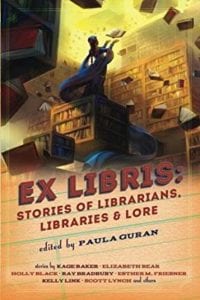
A compilation of science fiction and fantasy stories about librarians because, as Guran says, “Libraries and librarians are, after all, magical!”
Shelf Unbound: Why do you think librarians and libraries make for interesting subject matter in fiction?
Paula Guran: They are both fascinating and multifaceted. For a writer of speculative fiction, there’s also a dichotomy to consider. On one hand libraries can be magical places/people that provide access to knowledge, safety, rescue. On the other, we can’t help but realize there is already far more contained in books than any single person can comprehend; the future will bring even more and that’s a rather melancholy realization. There’s also a mysterious aspect: lost stories and knowledge that might be found within them. Librarians can assume many roles, including nefarious evildoers and powerful forces for good.
Shelf Unbound: How did you come up with the idea for this anthology and why did you choose to focus on science fiction and fantasy?
Guran: Science fiction/fantasy is what I do and what the publisher does. Since I’ve edited a lot of anthologies, I am always looking for ideas. I knew of several great stories, ran across a few more, and realized this was a great theme and doable. Libraries and librarians are, after all, magical!
Shelf Unbound: How did you select the stories included?
Guran: Once past the stories I was already aware of, I researched and came up with a list of possibilities. I did throw the list out on Facebook, and I got a few more good suggestions. And I researched some more. Finally, it is a matter of picking what one thinks will be the best stories and the best mix.
Shelf Unbound: Talk about how librarians have historically been depicted in fiction.
Guran: I think theses have been written on that! The negative cultural stereotypes are the prudish punitive woman and the timorous effeminate man. More recently, the “sexy” librarian has emerged. All are “keepers of knowledge” and masters of arcane systems to which we mere mortals are not allowed full access. I think there’s a trend now to portray librarians as heroic, intelligent “guardians.”
Shelf Unbound: In the “About the Editor” section at the end, it says of you: “Without the Belle Isle and Bethany branch libraries of the Oklahoma City Metropolitan Library system, she never would have made it through childhood.” What did these libraries mean to you as a child and what are your memories of them?
Guran: I was, not surprisingly, a voracious reader. Libraries were exciting places that would let you take books home—for free!—for two weeks. I can still visualize exactly what they looked like. When I was 10 or 11, some wonderful librarian allowed me access to the adult section. I remember going through the aisles letting the books “speak to me.” I had a half-serious idea that I was being “guided” to what books to borrow as I wandered through the stacks. I would find something of interest and then read most everything about it, or try a type of fiction or a particular author, and then look for more. So libraries provided entertainment and intellectual stimulation and probably filled what might have otherwise been some sort of terrible emotional abyss. And they opened the world up for me—books could take you anywhere, show you so much more than your own world.
